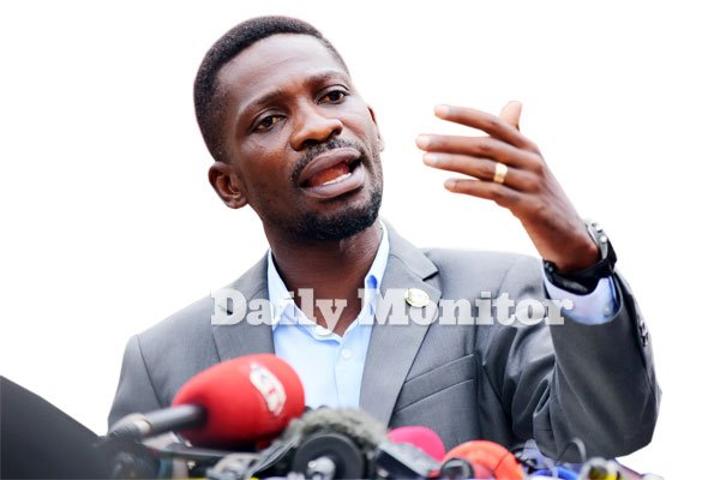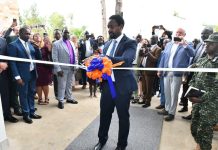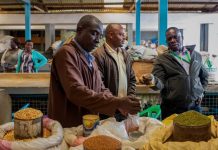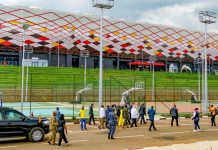Africa-Press – Uganda. On February 16, Robert Kyagulanyi summoned his lawyers, who included Medard Lubega Sseggona at the National Unity Platform (NUP) party headquarters in Kamwokya, Kampala, where they had a lengthy meeting.
Kyagulanyi was reeling from a court loss in which the Supreme Court had rejected his move to amend his petition out of time and now he wanted the same court to allow more than 100 affidavits that he hadn’t filed because of the deadlines that the Supreme Court had set following greenlight from his lawyers.
After the meeting, the lawyers departed and Kyagulanyi addressed a press conference in which he launched a blistering attack on the Supreme Court. The outgoing Kyadondo East MP accused three justices of having links with President Museveni.
He singled out Chief Justice Alfonse Owiny-Dollo, saying he representedMr Museveni during the Dr Kizza Besigye presidential petition of 2006, Justice Mike Chibita for being a former legal assistant to the President, and Justice Ezekiel Muhanguzi, who he claimed has relations with Gen Elly Tumwine, the minister of Security.
“We have questions about Chief Justice Owiny-Dollo, having been a former Museveni minister, having been a former Museveni defence lawyer and also we have seen pictures indicating that the Chief Justice has been meeting with Gen Museveni on a regular basis. We believe that within the law, that is wrong,” Mr Kyagulanyi said. “Therefore, we want the Chief Justice not to be part of this hearing. Not just the Chief Justice, there are other justices in the Supreme Court like (Justice) Mike Chibita, who we all know was the private secretary for legal affairs in Museveni’s office for seven years. We also know that (Justice) Ezekiel Muhanguzi is a relative of Gen Elly Tumwine, a person that the national and international community has castigated for abusing human rights,” Kyagulanyi said, before going ahead to issue another threat: “I am warning the Supreme Court that if they continue blocking our evidence, we shall withdraw our case from this court and take the matter before the public court,” he said. By the time Kyagulanyi made this warning, his legal team had failed to file all the affidavits they wanted to rely on in accordance with the deadlines the judges had given in presence of all the lawyers involved in the case.Two days after Kyagulanyi had asked the three justices to step down, his lawyers led by Sseggona yet again returned to the Supreme Court.
At the prompting of Attorney General William Byaruhanga, who accused Kyagulanyi of blackmailing the court, the justices asked Sseggona if he wanted to make an application for recusal as Kyagulanyi had said in the previous press conference, the lawyer astonishingly denied having any idea about it. “We don’t have such instructions,” Sseggona said.
“I haven’t heard of anything about it and we weren’t at the press conference.”Justice Owiny-Dollo, despite Sseggona’s denial, wasn’t about to let the matter rest and he called out Kyagulanyi without mentioning his name. “If anyone thinks he can intimidate, blackmail, induce the Chief Justice, then he is headed for a crash. I have a conviction that what I am doing is right,” he said, adding that whatever is being said outside the court premises has no bearing on the presidential election petition.
“I want to say that the judges took an oath to protect the Constitution. In the oath, we all took to exercise judicial functions entrusted to me in accordance with the laws of Uganda without fear, favour, affection or ill-will.”
Such a move was one of the many of scenarios in which Kyagulanyi or his legal team have said something in a press conference but they don’t follow up the action in court, leaving the courts and the respondents stunned.
“It seems they wanted to argue the case in press conferences,” Elison Karuhanga, who has been part of the Electoral Commission (EC)’s legal team, said. “In court, it seems they had no case.”
When he had just given his lawyers instructions to file a petition, Kyagulanyi, still in a press conference, boasted of how he had gathered enough evidence, including declaration of results (DR) forms to support his case and put the “biased judges on the spot.”
But once the case started, putting the judges on the spot became hard as Sseggona and his supporting cast didn’t have the evidence and they kept on blaming security agencies for imprisoning Kyagulanyi in his home after the elections or incarcerating his would be witnesses.
However, when Justice Owiny-Dollo asked Sseggona to demonstrate to the court how imprisoning Kyagulanyi in his own house stopped the rest of his team from gathering evidence, the Busiro East MP had no ready answer.
Kiryowa Kiwanuka, one of the lawyers who has been representing Mr Museveni, moved to put this entire argument to bed when he submitted: “In law, you gather evidence and then file a petition. Why would they rely on witnesses from whom they had not got evidence from?” he asked.
Still, the affidavits that were supposed to support Kyagulanyi’s petition have been the most contentious issue in this short-lived case.
Mr Museveni’s lawyers Kiryowa Kiwanuka (left), Edwin Karugire (2nd left) and Attorney General William Byaruhanga (seated, centre) have a discussion with Bobi Wine’s lawyers led by Medard Lubega Ssegona (right) at the Supreme Court in Kampala on February 11 before the pretrial of the presidential petition filed by Bobi Wine. Below is Bobi Wine addressing a press conference at NUP party offices in Kamwokya, Kampala on February 22. PHOTOS/ ABUBAKER LUBOWA/ MICHAEL KAKUMIRIZI
Although the petition was filed on February 1, Kyagulanyi didn’t file a single affidavit in court until the evening of February 14, when his lawyers filed 53 of them.
Sseggona severally told the court how the delay in filing affidavits was caused by security forces that had arrested people who would have been their witnesses. Yet when Kyagulanyi filed his 53 affidavits, the hawk-eyed lawyers of the respondents quickly realised that the affidavits had been sworn between February 10 and 11 but for some reason, Kagulanyi’s lawyers had never served them.
For instance, Francis Zaake, the Mityana Municipality MP, swore an affidavit on February 11, in which he accused a combination of military and police officers of forcefully sabotaging Kyagulanyi’s rallies during campaigns.
Paul Mwiru, who lost his Jinja South East MP seat to NRM‘s Nathan Igeme Nabeta, swore an affidavit still on February 11.Mwiru, in his affidavit, accuses the EC of not giving them secondary transportation seals and packing lists, and he also claims the military took over the polling station in his constituency and altered results.
“The soldiers then took the DR forms from agents and forced them to sign a blank DR forms and took ballot papers and boxes/election materials from the polling station,” Mwiru said.
Gerald Karuhanga, who lost the Ntungamo Municipality MP seat to NRM’s Yona Musinguzi, also swore an affidavit still on February 11, accusing the military of taking over the election process and arresting his polling agents.
“At around 11am on election day, I started receiving calls from my agents and supporters that the army had joined the queue at Kabahambi C/U [Church of Uganda], Kabagenda playground and Kikoni parish headquarters polling stations to participate in voting yet they were not in the register,” Karuhanga said.
Joseph Matsiko, a lawyer representing the EC, exploited the fact that Kyagulanyi’s team had affidavits but didn’t serve them immediately, accusing them of “bad faith.”
“They are asking for more time, but they have been with around 50 affidavits, but they never served them. We don’t know what their intention was. They shouldn’t be given more time,” Matsiko, a Kampala Associated Advocates (KAA) managing partner, said.
Sseggona’s position became precarious once it became apparent that Anthony Wameli, one of the lawyers who have been representing Kyagulanyi had told lies to court.
Wameli, who consequently and abruptly stopped appearing in court, swore in an affidavit in support of Kyagulanyi’s application to extend the time to file more affidavits, accusing Harriet Ssali Lukwago, the Supreme Court’s registrar, of tossing away more than 100 affidavits that allegedly belonged to the petitioner.
“On the said date, we were at court by 5pm with the said affidavits, only that some volumes got to court late after the court premises had been closed,” Wameli said. Lukwago predictably denied the accusation. “…. during the pre-hearing conference, on February 11, the court directed that counsel for the petitioner file all supporting affidavits by 5pm latest on February,14 and court still stands by that directive,” Lukwago said.
Put to him by the justices that Wameli was lying, Sseggona choose to abandon his colleague yet his law firm, Lukwago and Company Advocates, had drafted the contested affidavit. “My lords, I don’t know why my colleague decided to say that,” Sseggona said. “But that’s not our position. That’s why we are here for you to allow us more time.”
Still, Sseggona’s argument that many of their witnesses had been imprisoned and that is why they delayed filing, wasn’t helped when it came to light that the affidavits Kyagulanyi’s team wanted to file out of time included those sworn in by David Lewis Rubongoya, NUP’s secretary general, Mukono Municipality MP Betty Nambooze, and former journalist Robert Kalundi Serumaga, who security forces have never detained.
Final blow
On February 19, in a majority of 8-1, the justices gave a final blow to the petition when they refused to allow Kyagulanyi’s extra affidavits which he claimed were bound to prove incidents of ballot stuffing, how results were falsified, bribery incidents and how the independence of the EC was compromised in favour of Mr Museveni.






